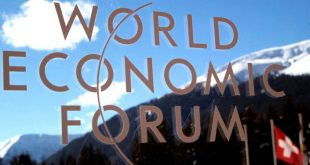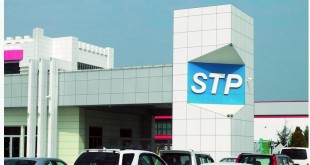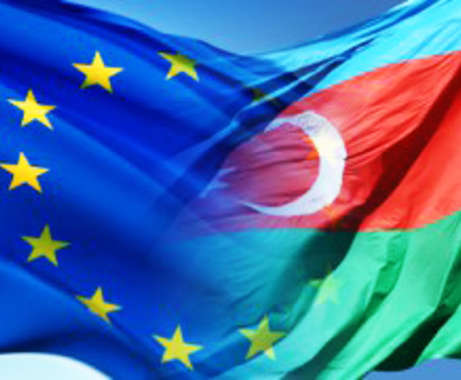
Introduction
In 2015 Azerbaijan has experienced substantial economic difficulties due to its dependence on oil exports and the drop of the oil prices, which eventually forced the Azerbaijani govermenment to devaluate its national currency. The fall in oil prices is essentially influencing the incomes and venture prospects, thus taking a toll on the national market demand. Capital surges and tensions are liable to stay high in 2016 because of Azerbaijan
has a restricted access to global capital markets. These difficulties may induce Azerbaijan to create closer ties with partner countries.
The cooperation of Azerbaijain with the European Union is very unique due to the already
existing relations and the good opportunities available to Azerbaijan related to the economic expansion. The economy of Azerbaijan is partly locked because Azerbaijan is not a member of the World Trade Organisation and cannot reach further steps to trade partnerships with big organisations or to stimulate ecconomic growth in big scale. The interest of the European Union in strengthening relations with Azerbaijan is clear after Federica Mogherini‘s trip to the Eastern Partnership countries in February 2016. Federica Mogherini is the High Representative of the European Union for Foreign Affairs and Security Policy and VicePresident of the European Commission. During her visit to Azerbaijan, Mogherini stated that
the EU hopes to renew the bilateral partnership with Azerbaijan and the need to expand the areas of cooperation of the European Neighbouring Policy (ENP). After the revision of the ENP there is a focus on the principle of differentiation which allows the government of Azerbaijan to select focuses of interest à la carte. Additionally, the EU stated the interest in creating new relationships between government and civil society organisations in order to
increase trust. 1
The EU-Azerbaijan relations started with the Partnership and Cooperation Agreement (PCA) signed on 22 April 1996 and entered into force on 1 July 1999. The political framework was set up within the European Neighbourhood Policy (ENP) on 14 November 2006. The fruitful cooperation among two parties has continued until nowadays. The last signed agreement entered in force on 2014 and it was the EU-Azerbaijan agreement on facilitating
the issuing of visas which makes easier and cheaper for citizens of Azerbaijan, in particular those who travel most, to acquire short-stay visas allowing them to travel to and freely throughout the EU2.
The EU assistance instruments had a positive impact among different sectors of Azerbaijan. The projects like Twining, Taiex, Sigma, as well as monetary support to different governmentinstitutions, as it follows1:
Moreover, the Technical Aid to the Commonwealth of Independent States (TACIS) provided technical support to Azerbaijan in the matters of institutional, legal and administrative reform, social consequences of transition and the implementation of the Azerbaijan‘s poverty reduction strategy, which was launched in 2003. Beginning in 2007 the European Neighbourhood and Partnership Instrument (ENPI) supported Azerbaijan in the areas of democratization, the rule of law and fundamental freedoms; socioeconomic reforms and implementation of EU standards to Azerbaijan’s legislation with the EU’s, energy and transport and regional and rural development. Later on in 2013 the ENPI would be replaced to the European Neighbourhood Instrument in 2014.3
Current negociations can lead to a new agreeement between the EU and Azerbaijan, that can bring the country to diversify the economy of the country. In general The EU means for Azerbaijan a partner for trade, investment and education, and helps the development of the rural regions, which have been the most affected by the economic downturn.
The Nagorno-Karabagh conflict is a big obstacle for Azerbaijan to adopt the European Union Association Agreement. The unstable conflict status affects all sectors and therefore it has a negative impact for the development of the country, as well as the international image in front of potencial investors.
Competitiveness and readiness of Azerbaijan to strengthen relations with the European Union Azerbaijan is a state in economic transition and definitely needs to engage further in relations with the European Union to overcome the current financial crisis and expand markets. Considering indicators that refer to competitiveness and readiness of the country we can analyze the case of Azerbaijan and observe what areas would need to be strengthened with the support of the EU.
Figure 1. The Global Competitiveness Index in detail. The case of Azerbaijan, Georgia and Russia

The Global Competitiveness Report 2015-2016 states that Azerbaijan ranks 40th position out of 140, two positions higher, in comparison the previous year. Azerbaijan ranked 43rd in basic requirements, 69th in efficiency enhancers and 66th in innovation and sophistication factors. Basic requirements refer to four main pillars (role of institutions, infrastructure, macroeconomic environment and health and primary education). Azerbaijan ranked 64th position in the role of institutions, 65th in infrastructure, 10th position in macroeconomic environment and 102nd in health and primary education. We can observe a clear need to improve the national education and health system in order to create a more efficient environment for competitiveness.
Regarding the pillar macroeconomic environment, it makes Inflation, annual percentage change, gross national savings, general government debt, ratio of GDP and government budget balance to be a competitive advantage for the country. As the figure 1 shows Russia has a bigger market size than Azerbaijan. İf Azerbaijan and the European Union establish a trade policy then the market size of Azerbaijan could increase to be equal to Russia‘s or be even bigger.
Figure 2. The most problematic factors for doing business
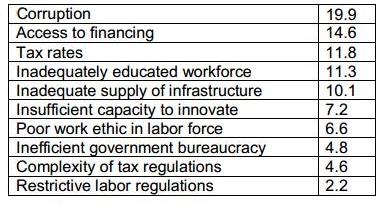
Following the data of the same report the study of the key indicators 2014 from the above chart state that the most problematic challenge to do business are corruption, access to financing, tax rates, an inadequately educated workforce, Inadequate supply of infrastructure and Insufficient capacity to innovate, among others.4
According to the 2015 Global Gender Gap Report of the World Economic Forum, the participation of female labour force is 68% and 73% for working age male population. Azerbaijan ranks for gender equality in the global index the 96th position out of 140 countries, the 54th in the indicator economic participation and opportunity, 90th position for the educational attainment, 139th for health and survival and 129th for political empowerment. The global position of Azerbaijan (96th) is lower position than following CIS countries :Kazakhstan 47th, Ukraine 67th and Russia 75th.
Only Armenia ranks even lower than Azerbaijan with the 105th position. According to the report, there is a need to create programs that will empower women and will create gender equality. The EU supports gender equality and programs that empower women could be very beneficial
for the country, in order to promote education, labour inclusion and expand the intellectual capital of the country
Energy Sector
The decline of oil prices in the previous months resulted in a devaluation of the Azerbaijani currency in February and December 2015, presents opportunities for the possible transformation on the economy of the country by strengthening ties with its partner countries. Regarding energy, the possibility of creating closer relations with the European Union is very feasible. The EU needs to diversify its supply of energy resources in order to guarantee energy security. Therefore, both Azerbaijan and the EU can benefit from closer ties.
Gas
Figure 3: Russian Gas Pipelines & imports in 2013. Actual flows per country point (CESD based on IEA data 2013)
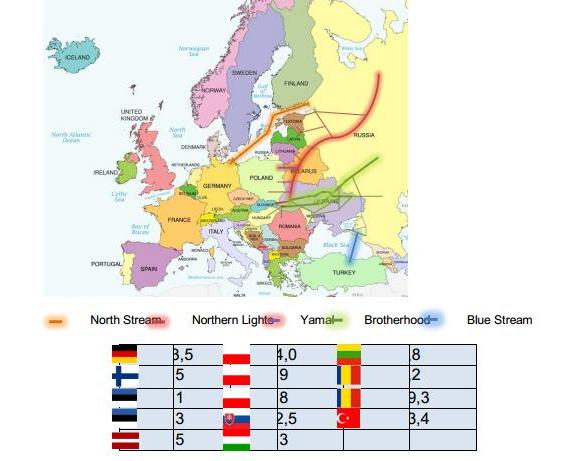
The rich natural resources of Azerbaijan are very important for the European Union. The Southern Gas Corridor project, which will start in Azerbaijan and pass by Georgia and Turkey, following from June 2016 continue through Greece and later on to other EU countries, guarantees the energy supply to the EU and a long-term client for Azerbaijan.
According to the Vice-President of the European Commission Maroš Šefčovič “Azerbaijan with its natural resources, is already a significant and reliable supplier of energy and we expect that role to become even more important with the completion of the Southern Gas Corridor‖. Geopolitically the closer ties to Azerbaijan in joint projects could reduce the European Union‘s dependence from Russian regarding gas. Thus, the Southern Gas Corridor Project will place the EU a better position for future negotiations and guarantee the diversification of their gas supply resources.
Until now the EU depends strongly on Russian gas. The figure 4 below shows the Motherline, Brotherhood and the latest Northern Line (created in 2013) as key pipelines to assure the gas security in the Northern and Central European countries.6
Figure 4: Russian Natural Gas exports to EU countries in 2015
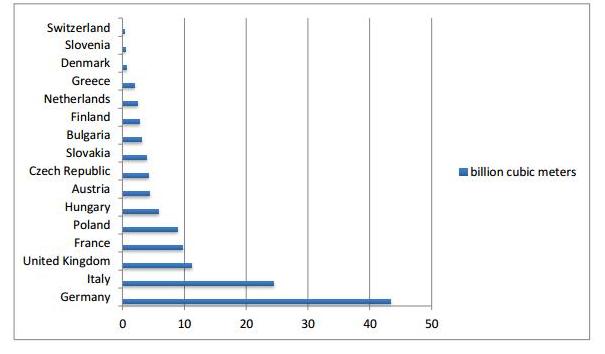
The European European market consumes the bulk of Russian exports. In 2015, Gazprom Export delivered 127,59 billion cubic meters of gas to the markets of the countries shown in the figure above. Germany, Italy and the United Kingdom are the top consumers of Russian gas. They imported 45.31, 42.42 and 11.12 billion cubic meters respectively. This dependence on Russian gas will decrease when Azerbaijani gas will arrive through the Southern Gas Corridor. The diversification of the gas supply will benefit the EU and will position it in a more comfortable place.
Southern European countries receive natural gas from the Northern African countries Algeria and Libya. These countries help the diversification of gas supply and at the same time benefit the relations between the Mediterranean countries.
Trade
The foreign trade turnover of Azerbaijan in January 2016 was 21,645 million dollars. The value for the oil exports is 11, 4245 million dollars and for the non oil export just 1,581 million dollars. The accession to the World Trade Organisation should be a priority for the government of Azerbaijan in order to transform the economy of the country. Joining the WTO can benefit Azerbaijan in several ways in the international trade sector. For instance, disputes will be handled constructively, rules and enforcement of such rules will provide a clear structure for traders that also will reduce the living costs for its citizens. The increase of variety of products and their quality would benefit the living standards of the Azerbaijani population. There would be a raise in the trade incomes that would stimulate the economic growth of the country. Regarding trade governance, through the basic principles of the WTO life can become more efficient and governments would be shielded from lobbying.
Mr. M. Mammad-Guliyev is the Head of the WTO Accession Negotiation Team on the membership of Azerbaijan to the WTO. At the 12th meeting of the Working Party there was a review on the negotiations for the accession of Azerbaijan to the WTO. It was stated that Azerbaijan must comply with the rules of WTO. The main issues discussed were about the application of discriminatory tax exemptions, production sharing agreements, local content requirements and investment incentives, state trading enterprises, permit requirements for alcohol and tobacco products, the commitment to
join the Information Technology Agreement upon accession , technical barriers to trade (product standards and certification), transition periods to implement WTO Agreements, and agricultural and non-agricultural export subsidies. Bilateral market negociations and legislative development in Azerbaijan received positive reports10
.
Once Azerbaijan will have reached the WTO quality and legal standards will be able then to start bilateral agreements with the EU, in order to export to Europe many more products that is exporting right now. The EU is the main trading partner of Azerbaijan accounting for around 42.4% of Azerbaijan’s total trade and the one of the most important investors10
.
According to the 2014 report from the EU regarding trade in goods with Azerbaijan in the figure 511, reached a total trade value of 16,689 million euros. The value of imports from EU to Azerbaijan is 13,207 million euros and for exports was 3,482 million euros. The disbalance shows the need to transform the current trade structure of Azerbaijan in order to develop and strengthen the economy of the country and expand of markets. Azerbaijan ranks as the EU‘s 26th partner for imports and 56th position for exports.
Figure 5: European Union. Trade with Azerbaijan in 2014

Figure 6. Trade flows by SICT section 2014 betwen European Union and Azerbaijan.
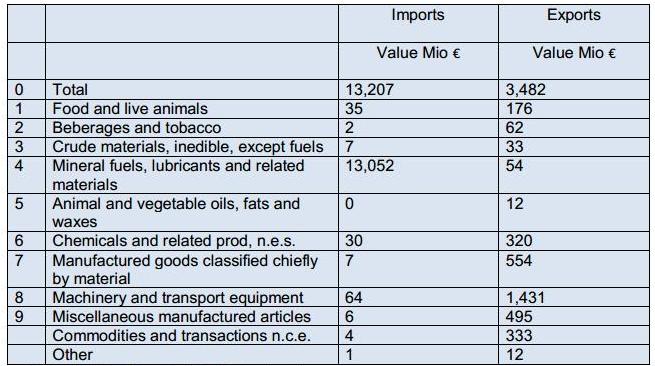
According to the Standard International Trade Classification (SITC) product grouping in2014 Petroleum and petroleum products ranked first for imports to the EU fromAzerbaijan with a value of 13,053 million euros which is equal to 98.8% of the totaltrade. As the figure 6 shows12 the economy is not diversified and Azerbaijan is exporting mostly oil to the EU, which accounts 13,052 million euros, more tan 98% of the imports to the EU. There is a clear need of diversification of the economy. Other products imported to the European Union are machinery and transport equipment with a total value of 64 million euros, agricultural products valued 36 million euros, transport equipment valued at 30 million
euros, manufactured chemicals valued at 30 million euros and power generation and non electrical machinery valued at 32 million euros. The WTO Agreement on Agriculture (AoA)13 established in 1995 allowed the trade of agricultural products between Azerbaijan and other countries. This agreement benefits the Azerbaijan‘s market access, domestic support and export competition. The export value from the European Union to Azerbaijan11 in 2014 was 3,482 million euros, from which 2,788 million euros are from iron and steel, chemicals and pharmaceutical manufactures. The value of 1,431 million Euro is related to the trade of machinery and transport equipment. From this total, 108 million euros are from office and
telecommunications equipment. Transport equipment was valued at 463 million euros, of which automomotive products were 291 million Euro. Regarding other machinery the total value was 855 million euros related to power generating, non electric machinery and electric
machinery. Other relevant trade data is the export to Azerbaijan of clothing with 105 million euros and scientific and controlling instruments valued 85 million euros. According to the Statistical Committee of Azerbaijan the value of import reached in 2014 to 9,187,697,600 USD from which 2,083,187,900 are related to the CIS countries.
Improvement on goods quality standards to create a EU trade policy
The access to global markets and especially EU ones stands for the adaptation to EU standards related to agriculture and industrial goods as well as to the WTO standards. In these terms we refer to the possible EU-Azerbaijan Deep and Comprehensive Free Trade Area and to the Sanitary and phytosanitary (SPS) measures by WTO.
The adaptation of agricultural and industrial products to international standards means a huge investment of time, human and natural resources as well as budgetary and training. Following the example of Ukraine, Georgia and Moldova, which already are associated countries to the European Union, Azerbaijan could be the next associated country in a near future.
The Deep and Comprehensive Free Trade Area (DCFTA) in a result of the Association between the EU and the Republics of Ukraine, Georgia and Moldova. This unique project intends to promote the trade relations and economic development by the opening of markets via the progressive removal of customs tariffs and quotas, and by an extensive harmonisation of laws, norms and regulations in various trade-related sectors, creating the
conditions for aligning key sectors of the Ukrainian, Georgian and Moldovan economy to EU standards. Azerbaijan could also in the future be part of this free trade agreement, after becoming associated country to the EU. Until then it is possible to observe and analyse the issues to consider.
The DCFTA consists of a compilation of these 14 chapters: Market Access for Goods (agricultural and industrial), Trade remedies, technical barriers to trade, Sanitary and phytosanitary (SPS) measures, custom and trade facilitation, establishment, trade in services and electronic commerce, current payments and movement of capital, public procurement, intellectural property, competition, trade related energy, transparency ,trade and sustainable development, dispute settlement and a mediation mechanism. Also the DCFTA needs the creation of 3 protocols so called ‗rules of origin‘, ‗Mutual administrative assistance in customs matters‘ and ‗Protocol on a Framework Agreement between the European Union on the General Principles for the Participation of Ukraine in Union Programmes‘. Finally, Azerbaijan would need to create an Institutional Framework.
The Sanitary and phytosanitary (SPS)16 measures by WTO tries to improve the human health, animal health and phytosanitary situation in all member countries by the establishment of a multilateral framework of rules and disciplines to guide the development, adoption and enforcement of sanitary and phytosanitary measures in order to minimize their negative effects on trade.
If Azerbaijan could access the WTO and then become associated country of the EU the DCFTA would mean a full reform in the structure of the agriculture and industries, as well as government and trade companies. The most important result of this joint is the diversification of the economy of Azerbaijan by exporting agricultural and industrial products to the EU market. Also the adaptation to international standards would mean the
development of the economies of the regions of Azerbaijan, which are based basically in agriculture goods.
As mentioned before, the entrance of Azerbaijan in the EU market would mean a big investment from the government, the European Union and private capitals. So far, as the figure 7 shows, 1,701 Azerbaijani enterprises working on agriculture would have to adapt to new regulations and product standards. The regions that could develop more their economies are, as the table below shows Ganca-Gazakh, Shaki-Zagatala, Lankaran, GubaKhachmaz, Aran and Upper Garagah. The Aran economic region could increase enourmously their annual turnovers.
Figure 7. Number of Agricultural Enterprises in Azerbaijan in 2014
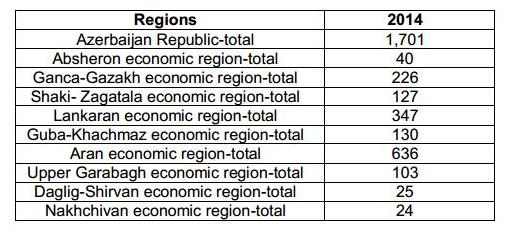
Figure 8. The number of acting industrial enterprises in Azerbaijan in 2014

The figure 8 shows18 that manufacturing industries are the most popular in Azerbaijan with a total of 1,762 enterprises, from which 499 work on manufacture of food products, 200 on printing production and 260 related to the manufacture of construction materials. The barriers of Azerbaijan to trade with the EU19 and to enter in the WTO are the so-called technical barriers to trade (TBT) these are technical regulations, product standards, geographical indicators and certification procedures. The obstacles especially concern the agricultural products that have to comply with a number of pre-set sanitary and phytosanitary measures which oftentimes create obstacles to trade. Especially if we take into account the fact that consumer protection is one of the highest in the world in the EU countries.
Another barrier that has the same importance that others mentioned before or even more is how Russia could react after the agreement of Azerbaijan with the European Union. After Russia and Azerbaijan signed in 2014 the Mutual Investment Fund. According to Russia‘s Economic Development Minister Alexei Ulyukayev ―Resources of the Russian-Azerbaijan fund may be used to finance priority projects, particularly in trade, transport and agriculture‖. It could be possible that Russia could have a negative reaction and to take actions, for example, banning the import to Russia of Azerbaijani products, or banning Azerbaijani-owned industries in Russian territory.
Finance
According to World Economic Forum, Azerbaijan ranks the 114th position out of 160 in the financial market development. This not positive position proofs one of the causes of the current situation that Azerbaijan faces in 2016.
Recently Azerbaijan has experienced several economic reforms in order to combat the economic crisis. The president Ilham Aliyev appointed to the first deputy minister of the Ministry of Taxes Natiq Amirov as advisor to create some changes in the financial structure of the country. As a result, Mr. Amirov has created his own program in order to create more financial stability based on four contours that cover the four main ideas of the president :
1. The stability of the financial markets, the liquidity recovery of Manat, as well as the strengthening of financial discipline.
2. Export promotion.
3. Formation of the internal market and the termination of import dependence.
4. Stimulation of entrepreneurs, in particular, producers of agricultural products through public procurement. Two institutions have been created to implement these plans: The Chamber of Control of Financial Markets and Appellation advice to support entrepreneurs.
The most conceptual approaches on which reforms are based in transition countries built on such basic pillars as:
1. Fighting corruption – transparency and accountability of government agencies and officials to the community, easy and equal access to any resources.
2. Demonopolization of economy – free export and import of goods, services, capital, equal conditions of competition.
3. Liquidation of black market and legal movement of capital and taxes
4. Independence of judicial system – protection of the rights and interests of entrepreneurs
5. Establishment of promotional duties and taxes for the manufacture, export and import of goods and services.
6. Restoration of all branches of government, elected by the people and accountable to it through internationally recognized elections. Following to the new financial body in the government of Azerbaijan led by Natiq Amirov also the President of Azerbaijan Ilham Aliyev approved on March 10, 2016 the amendment to the law of the Central Bank of Azerbaijan in which the CBA changes its status of ―public authority‖ to ―public legal entity‖23. As a result, it lost most of its power. From now on the Central Bank of Azerbaijan will have capacity just to organize and ensure the activity of interbank centralised and other licensed payment systems, to support the maintenance of the stability of the banking system and the formation of monetary policy. Additionally, the Bank of Azerbaijan cannot licences to credit institutions.
The financial scenario in Azerbaijan can improve by copying patterns of fiscal governance and starting cooperation with similar structures from the European Union. For example the Economic and Financial Committee could guarantee more transparency with the EU. The start of openness of data with the EU regarding financial issues could avoid financial international crimes such as money laundering, evasion of capitals, bribery and corruption,
cyber-crime, market abuse and insider dealing or the violation of security information.Given the nature of the current electronic payment systems with the already expanded ICT tools, the copy of payment pattern like in the EU could provide a legal foundation that could booster the conventional trade and e-trade with European Union countries.
Visa liberalisation
The Visa Liberalisation Action Plan (VLAP)24 is a largest success of the Eastern Parthership. So far, the successful results of Moldova25 already proved that the visa-free regime with the European Union was possible and it did not lead to irregular migration or significant inflow of asylum seekers. Moldovan nationals could travel to EU without visa since April 14th, 2014. The next countries to enjoy the VLAP are Georgia and Ukraine in summer 2016 after the release of the fourth and final progress report adopted on 18 December 2015. The VLAP sets a series of precise benchmarks for four ‗blocks‘of technically relevant issues, with a view to adopting a legislative, policy and institutional framework (phase 1) and ensuring its effective and sustainable implementation (phase 2).
The benchmarks need to be met before Azerbaijanian nationals holding biometric passports can enter the Schengen zone for short stays without the need for a visa. Beneficiaries of the visa waiver holding a biometric passport could transit through or stay in the territory of the EU Member States (except for the United Kingdom and Ireland) and Schengen associated States for a duration of no more than 90 days in any 180 days period without
applying for a visa. Kosovo‘s application for visa liberalisation is in process because still has 8 benchmarks toammend. According to the Eastern Partnership Visa Liberalisation Index the candidate countries to follow the visa-free action plan are Armenia, Azerbaijan and Belarus. So far
none of them complies with the four blocks that are composed by different policy issues.
The four blocks are the structured as it follows:
Block 1 – Documents security including biometrics
Block 2 – Irregular immigration, including readmission
Block 3 – Public Security and Order
Block 4 – External Relations and Fundamental Rights
A potential Visa Liberalisation between the European Union and Azerbaijan is very important because it could increase enormously the mobility from EU countries to Azerbaijan and vice-versa. Visa liberalisation is a very big step to promote the integration to the EU because it turns Azerbaijan to become a trade partner with full conditions, explore investment opportunities and to increase people-to-people contact in order to avoidconflicts.
Regarding the current situation of the 4 blocks that Azerbaijan will have to comply stand as it follows:
Block 1 – Documents security including biometrics
Adaptation of biometric passports
The government of Azerbaijan started in 2007 the compliance of the international rules in order to access to international passport with the “State Program on the creation of a system of biometric identification of the Republic of Azerbaijan for 2007-2012”, approved by a Decree of the President of the Republic of Azerbaijan dated 13 February 200729, and Decree No 686 dated 17 July 2012 “On Amendments to the Law of the Republic of
Azerbaijan on Exit, Entry and Passports”. The legal and regulatory framework governing the issuance of identity documents has been improved.
Since 2012 the government of Azerbaijan started the process for the adaptation of the biometric passports under the decree of the President of Azerbaijan of 17 July 2012. Later on, in 2013 it was launched the possibility for Azerbaijani citizens to obtain their biometric passports.
The Azerbaijani Service and Assessment Network (Asan Service) was able to facilitate to citizens of the Republic of Azerbaijan since November, 3 2015 the issuance of passports. This step provides the service to individuals while keeping transparency.32 Almost all Azerbaijani citizens count on biometric passports nowadays.
Document security
Since 2007 the document security is fullfilled in this matter. The State Program on Establishing Biometric Identification System in the Republic of Azerbaijan in 2007-2012 (SPEBISRA) and the law on ―Biometric information‖ from 2008 let Azerbaijan to fulfill the document security equirement. In this law, biometric information included finger, palm and face prints, iris of eye, the fragment of voice and its acoustic features, the result of DNI analysis, the sizes and special features of body, hand-writing and signature and etc. SPEBISRA set the plan of actions for the years 2007-2012 to fully implement the latest biometric technologies in Azerbaijan33.
Block 2 – Irregular immigration, including readmission
Border management policy & Migration
The issue of arrivals and departures to Azerbaijan and passport issues was already regulated by the law on ―To depart, to arrive and passports‖ which was adopted on June 14, 199434. A new regulation in 2001 ―Exit enter‖ utomotive information-searching system (AMAS)‖35 let the creation of a system that provides an intergovernment information database of the Ministries of National Security, Defence, Internal Affairs, Foreign ffairs, Justice, Taxes, as well as State Border Service, Special State SecurityService and State Marine Service at the Ministry of Cabinet. To this extendt, it is assured the management of the borders of Azerbaijan.
According to the law on Immigration, which was adopted by the Republic of Azerbaijan on December 22, 1998, it is stated that an immigrant is a person (foreign citizens and persons without citizenship)36 who is permitted to live in Azerbaijan permanently. In order to facilitate resident permits to foreigners and promoting transparency in the country it was established the ―One Window System‖ 37 in migration management in June 2009 .
The system was very fruitful due to the will to fight against corruption. The enourmous change in the beaurocracy of Azerbaijan created after the one window system was very beneficial for foreigners because with the new decree they would have to go only to one office avoiding a waste of time and corrupted activities in order to get their ID cards.
Block 4 – External Relations and Fundamental Rights
The immigration policy of Azerbaijan in 2010 turned be more closed to the inflow of foreigners into the country. The release of the decree no. 326 on ―the registration of visas of foreigners and persons who do not have citizenship‖38 established the issuance of visas at the Azerbaijani Consular Sections abroad one month before their arrival to the country. Until this decree was implemented foreigners could get their visas upon arrival at the airport or borders. The new rule would create a drammatical inflow of foreigners that would want to visit the country. In 2013 the situation improved with the implementation of the new system of e-visa39 that would let foreigners to get tourist visas online applying through one of the travel agencies
that have government license. The new decree In this way tourists can get an electronic document that let them get their visas at the borders or airports of Azerbaijan. Azerbaijan recently announced new visa regulations for nationals from Bahrain, China, Israel, Japan, Kuwait, Malaysia, Oman, Qatar, Saudi Arabia, Singapore, South Korea and United Arab Emirates. New regulations let citizens from the countries mentioned before to
get 30-days visa upon arrival only to international airports.
Block 3 – Public Security and Order – Public Order and Security
Since its independence, the Republic of Azerbaijan has ratified almost all significant international Conventions and treaties against organized crime, corruption, terrorism, human trafficking, as well as human rights. The index of crimes in Azerbaijan is very low which offers a good and safe destination for foreigners.
One of the main challenges of Azerbaijan, which is on the priorities of the country is to combat corruption in order to guarantee prosperity, economic, social and economic development. Corruption promotes the block of the Azerbaijani economy and the link to new opportunities. The situation is negative but keeps improving year after year. According to the Corruption Perception Index 2015 of Transparency International, Azerbaijan ranked 119th place among 178 states of the world. In the last 5 years the position in the rank has improved 15 positions but still the government has failed to achieve substantial results in the last few years despite administrative and legislative measures. One of the improvements of the situation in Azerbaijan is the amnesty act related in March 2016. After the call of Federica Mogherini42 43 for the release all political prisoners and the call from 21 international organisations44 led the Supreme Court of Azerbaijan to release most of them.
The acceptance of instructions to promote democracy and freedom of expression help the mutual dialogue between the EU and Azerbaijan. International organisations have welcomed the amnesty act by the President Ilham Aliyev proving the will for further cooperation with European Countries. The visa liberalisation could benefit especially the industry of tourism for both Azerbaijan and EU. The fact of requiring a visa for visiting Azerbaijan makes it to be a difficult destination due to the time and money invested in getting it. The fact of getting visa upon arrival for tourism (30 days) as announced for other countries would facilitate the chances to receive European Union tourists.
Another sector that can be benefited from the visa liberalisation is the business sectors. Business trips / study visits could be easier to organise if EU citizens would not need a visa for travelling to Azerbaijan, or at least could get it upon arrival at the airport for short periods (for example 30 days). Additionally, Azerbaijan, and especially Baku could become a city strategically located to organise international conferences as it happens with Tbilisi
(Georgia).
Visa liberalisation could also benefit European tourist companies to increase the number of tourism, therefore it would have an impact in different sectors (hostelry, transport, construction, catering services, etc. and the already existing infrastructure could be exploited.
Tourism
The data available by the Statistical Committee of Azerbaijan shows that 2,004,000 tourists arrived to Azerbaijan in 2015. The share of tourism industries was 4.1% in the GDP. In 2014, the most of tourists from European Union countries came from Germany 1,353 tourists, Spain 1,103 tourists, Italy 927, United Kingdom 844, France 722, Czech Republic 709 and Finland 26.
In 2014 the data showed that 2,297,800 foreigners arrived to Azerbaijan for different purposes (business, tourism, education, etc.). Since the moment foreigners are arriving to Azerbaijan independently of their reason they become consumers of the country‘s goods because they have human needs and they have leisure time. This means that all foreigners arriving to Azerbaijan indirectly are users of the different tourism businesses. Out of
2,297,800 foreigners, 2,159,700 came for tourism purposes.
The highest number of foreigners coming to Azerbaijan refers to Russian nationals. The constant flows of Azerbaijanis with Russian nationality do not represent necessarily a big impact to the tourism business since many Russian nationals stay with their relatives at homes and not in hotels. İt can be observed in the list above of foreign nationalities a total of 101,638 EU nationals in 2014. This number could increase if the visa regime for EU citizens
coming to Azerbaijan gets simplified or abolished. For instance, in Georgia EU nationals canstay in the country with tourist status up to one year.
Figure 9. Number of arrived and departured tourists by countries
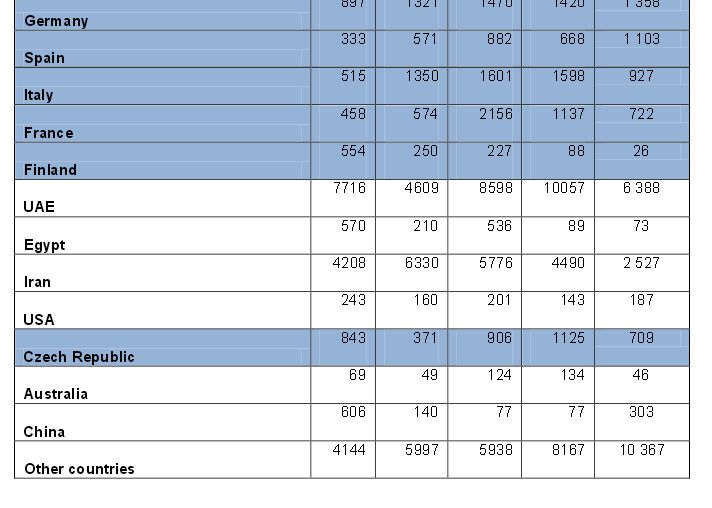
Figure 10. Number of EU citizens arrived to Azerbaijan by countries in 2014
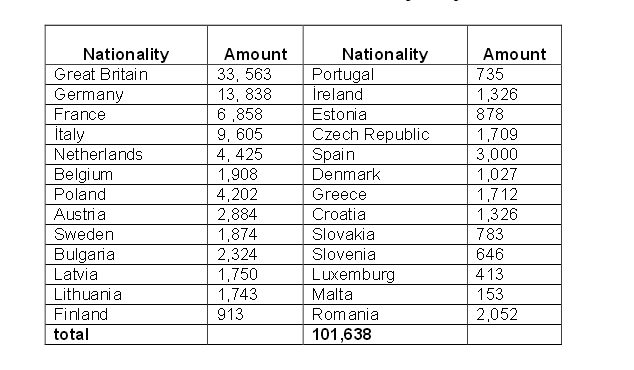
Figure 11. Number of accommodated EU citizens in hotels and similar establishments by countries in 2014
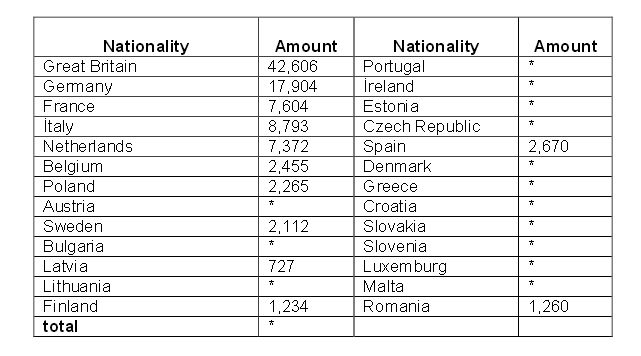
Figure 12 . Amount paid to hotels and similar establishments for rooms by EU citizens in 2014
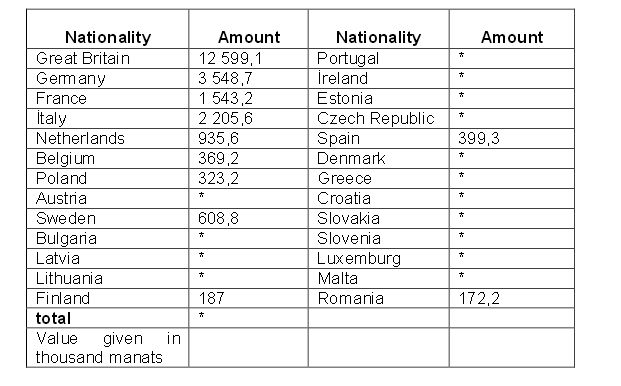
The nationality that most visited Azerbaijan is the United Kingdom48 with an amount of 42,606 visitors and a total expense in 2014 of 12,599,100 AZN, which was equal to 12,114,519 USD. It makes an average expense of 284, 3 USD. As explained before, the data related to the amount paid is not realistic and needs to be revised.

The year 2015 meant for Azerbaijan a boom in tourism due to the Baku 2015 European Games. The total number of international tourists arrived to Azerbaijan was 2,004,000 but until now we do not have specifications about the data. The year 2016 and 2017 are also very important because of the continuation of international sports events like Formula 1 and the Islamic Solidarity Games. The 218 existing businesses related to tourism in Azerbaijan have more opportunities to increase their economy. As the figure 12 shows, almost all tourism companies are non-state properties, which is a tool to increase and to boost the entrepreneur skills from individuals. During the Baku 2015 European Games, to travel to Azerbaijan was possible if the tourist would purchase tickets and present them when applying for visa at the Consulates of Azerbaijan abroad. The same pattern can be repeated this year for the Formula 1 Grand Prix 2016 in Baku. The labor market engaged to the tourism sector in 2014 was 1,794 workers49 and this number will increase the course of 2016 due to the international competitions and the flow of foreigners visiting Baku and other famous cities like Shaki or Ganja. Regarding the nature of the tourism that foreigners choose when coming to Azerbaijan we can mention that out of 2 159,7 foreigners that come from tourism 709,9 chose leisure and recreation, 607,5 chose business tourism, 46.3 treatment tourism, 13,7 religious tourism, 677,1 visiting relatives or friends and 42,2 other tourism.
The development in the sector of tourism in Azerbaijan has increased gradually. As the table shows in 2006 only existed 96 enterprises working on the tourism sector and in 2014 the data changed to 2018. Definitely the organisation of international events such as Eurovision, Baku 2015 European Games, Formula 1 Grand Prix or the Islamic Games for Solidarity are one of the reasons. The arrival of international tourists creates an flow of money that affects positively to the national economy. European Union citizens in order to obtain tourist visa to visit Azerbaijan have to apply via the Consulates of Azerbaijan abroad. This procedure takes from 1 to 9 days. Starting from March 15, 2013 a new procedure of tourist e-visa system was implemented in Azerbaijan to provide the execution of the Decree of the President of the Republic of Azerbaijan dated November 20, 2012 ‗On the facilitation of visa procedures for foreigners and stateless persons, travelling to the Republic of Azerbaijan‖. In this way individuals can apply online
electronic visas (e-visas). E-visas are single-entry and are valid for a maximum duration of 30 days. In order to get e-visa the individual must book a package with one of the 33 authorized travel agencies. The fact that there is the need for a visa in order to visit the country many tourists prefer to visit Georgia, because Georgia counts also with unique natural resources and similar tourism industries for summer and winter sports. EU citizens
can visit Georgia with tourist status up to 1 year50.
We can analyze the data of Georgian figures. The international tourism receipts in Georgia in 2014 reached the value of 1,787,140,000 USD, a 4% higher than the previous year51.
The share of tourism in the Georgian GDP is 6% in both 2015 and 2014, while in Azerbaijan 4.1%52 . The total amount paid to hotels and similar establishments for rooms by foreign citizens was 83,476,500 AZN, which was approximately 80,265,865 USD. The information provided by the State Statistical Committee of the Republic of Azerbaijan does not represent the real figures. Considering that in 2014 the number of accommodated
foreign citizens in hotels and similar establishments was 392,790 and the expenditure was 80,265,865 means that the average expenditure for every tourist was 204,34 USD. The value provided in unrealistic33 . One of the reasons why the State Statistical Committee of the Republic of Azerbaijan could not get the real data is because many tourism establishments do not report to the government with the real figures in order to pay fewer
taxes. For example, if an international tourist that does not need a visa (for example coming from Russia) means that this tourist does not need a letter of invitation and therefore also the company does not need to report about the business activity. The number of international travellers in Georgia reached the amount of 5,515,559 in 2014, while in Azerbaijan it was 2,297,8045553.
Georgia, a country with less than the half of labor capacity than Azerbaijan has, is capable to attract the double tourism that Azerbaijan does. The most interesting factor is that the natural resources of Azerbaijan are similar to the Georgian ones and the transport infrastructure in Azerbaijan are more developed than the Georgian ones. These factors show a clear need to facilitate the entrance of potential tourists to Azerbaijan with a visa
liberalisation or more flexible conditions, and a restructure in the foreign policy towards the European Union.
If EU citizens could visit Azerbaijan in the same terms than they do to Georgia the annual turnover related to the tourism sector could be multiplied by three, therefore the industry of tourism would develop in terms of infrastructure, quality, international standards and would have the possibility to create more sustainable projects.
The positive part of the devaluation of the national currency (Azerbaijani manat) is that now Azerbaijan is a more attractive destination for European tourists since the value is almost half price than it was before. Visiting Azerbaijan means for them to have a holidays with the same standards that they have in Europe for almost half price. Therefore right now Azerbaijani prices can almost compete with the Georgian ones.
Labour Market
The European Union already started cooperating with Azerbaijan regarding higher education. The Erasmus Plus Program is having an impact in the development of economy in Azerbaijan in a mid-long term that brings expertise to several industries. The ERASMUS+ programme aims to boost skills and employability, as well as modernising Education, Training, and Youth work. The seven-year programme has a budget of €14.7 billion; a 40%
increase compared to current spending levels, reflecting the EU‘s commitment to investing in these areas.
The Azerbaijani higher education system already started the adaptation to the Bologna process. Indeed, 31 state higher education institutions, 7 special assignment higher education institutions, an 16 private higher institutions are part of the Erasmus+ Programs.
The possibility of students, experts and trainers to travel to EU countries for exchange programs or participation in full programs of doctorate or master degrees has a direct impact in the intellectual capital of Azerbaijan. Students or experts who go to the European Union countries for education and come back to Azerbaijan become multipliers of the European Union values and are ready to join the labor market. The high quality of many EU universities lets Azerbaijani students to come back to their original country and become actors of the economy of Azerbaijan.
Between 2007 and 2015 the United Kingdom has been the first destination for studying abroad among Azerbaijani students (1,032 students), 3rd Germany (441 students) and 5thNetherlands (181 students) 55.
Additionally, the possibility of EU students and experts to visit Azerbaijan with exchange programs promotes mutual understanding, compats racism and hate of speech and creates opportunities for partnerships in all sectors.
With a stronger cooperation of Azerbaijan and the European Union the labor market trends could have a change of path. Moreover, the free mobility between EU and Azerbaijani citizens could help educated experts from Azerbaijan to work in the European Union countries and to EU citizens to find job opportunities in new projects in Azerbaijan where there is a lack of expertise. The visa liberalisation or at least the possibility to create mobility
for some sectors like tourism or business could foster the economy of both the European Union and Azerbaijan.
Conclusions
Azerbaijan can be diagnosed with a serious undiversified economy and has a restricted access to global markets. It needs to restructure its foreign policy approach towards the European Union because of the devaluation of the national currency and also in order to diversify the economy.
The Nagorno-Karabagh conflict is a big obstacle for Azerbaijan to get closer ties with the European Union. The occupation of 20% of the territories and war in the country affect the economic, social and political development of the country. The accession to the World Trade Organisation would mean an opening window to the association to the European Union. The adaptation to international standards would make stronger the governmental structure of Azerbaijan.
The European Union has shown through the years and currently the great interest in establishing further negotiations with Azerbaijan and the wish to reform the current partnerships, especially in the matter of energy (gas) through the The Southern Gas Corridor project, that involves also Georgia and Turkey. This project would be very significant for the European Union in order to diversify the energy supply from Russia and to guarantee energy security for the EU.
The accession to the World Trade Organisation and moreover the reach to the European Union Association Agreement would mean for Azerbaijan the access to international markets and a larger access to the EU markets. The process of adaptation to the Deep and Comprehensive Free Trade Area needs time, capital investment, training programs and the national restructure of industrial and agricultural sectors. According to the World Economic
Forum, in Azerbaijan corruption is still one of the most problematic factors for doing business. Therefore, the restructuring of governmental agencies as well as the interaction of industrial and agricultural sectors based on international rules could provide more transparency for the country.
In order to fight the economic crisis and to create financial stability the government of Azerbaijan has initiated some economic structural reforms led by first deputy minister of the Ministry of Taxes Mr. Natiq Amirov. As a result, two institutions have been created: The Chamber of Control of Financial Markets and Appellation advice to support entrepreneurs.
This initiative intends to fight corruption and create a demonopolization of the economy, liquidation of black market and legal movement of capitals and taxes, Independence of judicial system, Establishment of promotional duties and taxes for the manufacture, export and import of goods and services; and a restoration of all branches of government. The visa liberalisation implies the free mobility for Azerbaijan and the European Union. This change could benefit both EU and Azerbaijan in the matter of creation of new business structures and the most important factor, it would improve enormously the tourism in both sides. Azerbaijan counts on similar natural resources Georgian ones, however Azerbaijan receives 50% less tourists than Georgia. The development of tourism industries would affect also the sectors of construction and services.
Moreover, the Nagorno-Karabagh conflict gives a constant negative image to Azerbaijan in front of international tourists. Ambiguous information released in the Media has a potential to affect negatively attraction of international visitors and have a unfavorable impact in the annual tourism revenues.
In 2015 2,004,000 tourists arrived to Azerbaijan. The data available by the State Statistical Committee of the Republic of Azerbaijan from 2014 states that only 101,638 visitors were EU nationals. Most of tourists from European Union countries came from Germany, Spain, Italy and the United Kingdom. The share of tourism industries was 4.1% in the GDP. This share could easily increase by the visa liberalisation or creating more flexibility for international tourists while getting tourist visa, especially EU nationals. For the current 2016 year, a high number of international visitors is expected for the Grand Prix Formula 1 in June 2016.
Azerbaijan ranks the 40th position out of 140 in the Global Competitiveness Report 2015-2016 report, ranking 10th position in macroeconomic environment and 102nd in health and primary education. The position of health and primary education are evident keys for future transformation in the structure of these sectors. There is a clear need to improve the public health system as well as the educational one.
As of 1 April 2016, The European Union has funded a high amount of programs that reinforce the financial instruments for institutional building. So far, Twinning projects have been initiated and are in different phases presently (25 – concluded, 8 – being implemented, 4 – in contract negotiation, 2 – in call for proposals and 4 – in preparation stages), 211 TAIEX (including 64 multi-country) events have been implemented and 15 SIGMA assistance projects (all completed) have been implemented. The high position in macroeconomic environment facilitates new entrepreneurs to become actors of the economy of Azerbaijan. However, according to the same report (Global Competitiveness Report 2015-2016) corruption is still the most problematic factor for doing business, followed by access to financing, tax rates and inadequately educated workforce.
The fact of expanding the size of markets as well as accessing to global markets is possible if Azerbaijan joins the World Trade Organisation and adapts its products quality to international standards. Azerbaijan could equal the size of its market to the Russian one by creating closer ties with the European Union. Therefore, Azerbaijan would become less dependant on Russia‘s foreign and trade policy.
Azerbaijan still finds some obstacles in gender integration and participation in the economic sphere. The 2015 Global Gender Gap Report of the World Economic Forum states that Azerbaijan ranks 90th position for the educational attainment, 139th for health and survival and 129th for political empowerment. The global position of Azerbaijan (96th) is lower than following CIS countries: Kazakhstan 47th position, Ukraine 67th position or Russia 75th position. The current situation calls for the restructuring in national gender policies in order to empower women and the economic and social life.
Regarding labor force, the Azerbaijani higher education system already started the adaptation to the Bologna process. The contribution from the EU to the improvement of the higher educational system through the Erasmus Plus program helps to increase of the country‘s intellectual capital, supporting workers with educational tools ready to face global challenges, with European educational standards. The visa liberalisation could benefit also
the labor market for both parties. Azerbaijan counts on specialists that could provide expertise in Europe and vice-versa.
Recommendations
– To transform the Azerbaijan‘s foreign policy towards the European Union in order to promote trade and mobility.
– To diversify the economy of the country by allocating national investment in the sectors of agriculture, industry, trade and tourism.
– The WTO Accession Negotiation Team on the membership of Azerbaijan to the WTO to foster negotiations for the accession to the World Trade Organisation in short term. The more the accession to the WTO is delayed, the less developed is the economy of Azerbaijan and partly blocked to the access to global markets.
– To eliminate tourist visas for EU citizens; if not possible, at least to provide more flexibility by getting tourist visa upon arrival at the international airports or borders.
– To create a favourable economic environment for new entrepreneurs by providing training and access to financing for the sectors of agriculture, industry, trade and tourism.
– To increase the relations with civil society organisations in order to have a more harmonized society and improve trust towards the goverment.
Bibliography
A year later without reforms. Contact. 12.02.2016. Web.
http://www.contact.az/docs/2016/Analytics/021200146735en.htm#.Vt9V_ikhPmE. Retrieved on
01.03.2016.
About Tourism in Azerbaijan. Ministry of Culture and Tourism of the Republic of Azerbaijan. Web.
http://mct.gov.az/about-tourism . Retrieved on 01.03.2016.
Asian Development Bank. Asian Integration Report 2015. How can special economic zones catalyze
economic development?. Manila. Philippines. 2015. SBN 978-92-9257-246-4
Azerbaijan Central Bank‘s functions limited to ensuring activities of payment systems and aid in
maintaining banking system stability. ABC.az. 10.03.2016. Baku. Azerbaijan. Web.
http://abc.az/eng/news_10_03_2016_94757.html retrieved on 10.03.2016
Azerbaijan State News Agency. Tacis continues to finance projects in Azerbaijan. 04.08.2003. Web.
http://azertag.az/en/xeber/TACIS_CONTINUES_TO_FINANCE_PROJECTS_IN_AZERBAIJAN-545318 .
Retrieved on 20.02.2016
Azerweb. Short information about the Tacis Programme in Azerbaijan (TACIS). Web.
http://www.azerweb.com/en/program.php?id=136 . Retrieved on 22.02.2016
Chiragov, Fuad. Bayramov, Vugar. Paving the road towards visa-free travel between the Eastern partnership countries and the EU; a case of Azerbaijan. Center for Economic & Social Development. Baku. 2011. Web. http://visa-free-europe.eu/wp-content/uploads/2012/03/Azerbaijan-Visa-Facilitation-Report.pdf . Retrieved on 29.03.2016
Clingendael International Energy Program. Fact Sheet. CIEP. www.clingendaelenergy.com Retrieved on
12.03.2016
Contact.az. Federica Mogherini Calls for Release of All Political Prisoners in Azerbaijan. 29.03.2016. Web. http://contact.az/docs/2016/Politics/032800150921en.htm#.VvzXoUAld-c. Retrieved on 23.03.2016
Contact.az. 21 beynəlxalq təşkilat Azərbaycanda bütün siyasi məhbusların azad edilməsinə çağırır.
19.03.2016. Web. http://www.azcontact.info/docs/2016/Politics/031900150420az.htm#.VvzZB0Ald-c.
Retrieved on 23.03.2016
Council of European Union. Pao for coordination of EU programs in Azerbaijan. EU-Azerbaijan Agreements/Programmes. Web. http://pao.az/en/eu-azerbaijan-agreements-programmes. Retrieved on
01.03.2016
Embassy of the Republic of Azerbaijan to Canada. Visa facilitation in international Airports of the Republic
of Azerbaijan for citizens of several countries. Web. http://ottawa.mfa.gov.az/content/36. Retrieved
15.03.2016
European Commission. Development & Cooperation – EuropeAidEvaluation of EC Tacis Country
Strategy. Azerbaijan 1996-1999 – ref. 951538. Web.
http://ec.europa.eu/europeaid/how/evaluation/evaluation_reports/2000/951538_docs_en.htm Retrieved
on 16.03.2016
European Commission. European Union, Trade in goods with Azerbaijan. Directorate General for Trade.
20.10.2015 http://trade.ec.europa.eu/doclib/html/113347.htm . Retrieved 25.02.2016
 Oval Useful news from Azerbaijan and Caucasus
Oval Useful news from Azerbaijan and Caucasus
